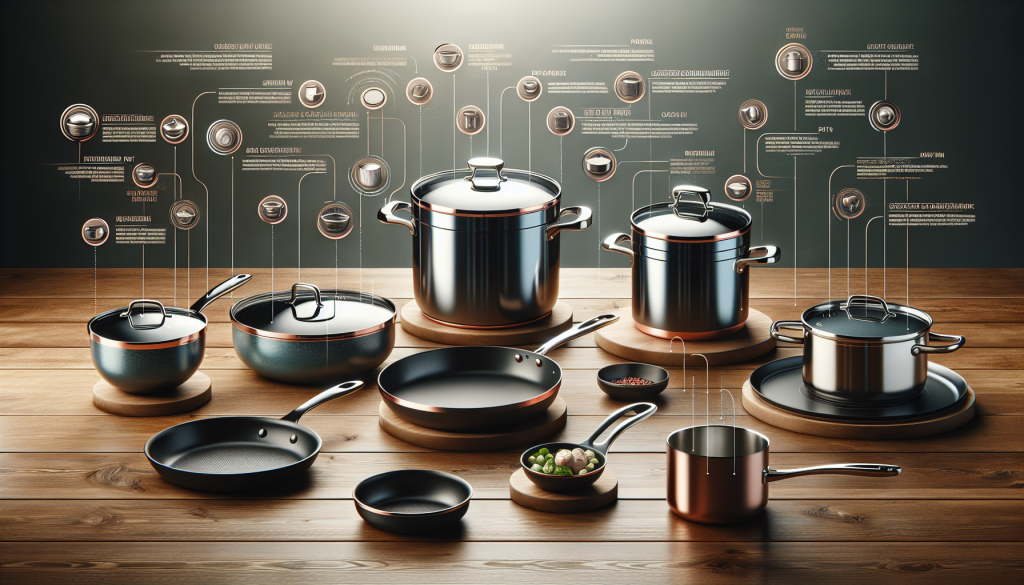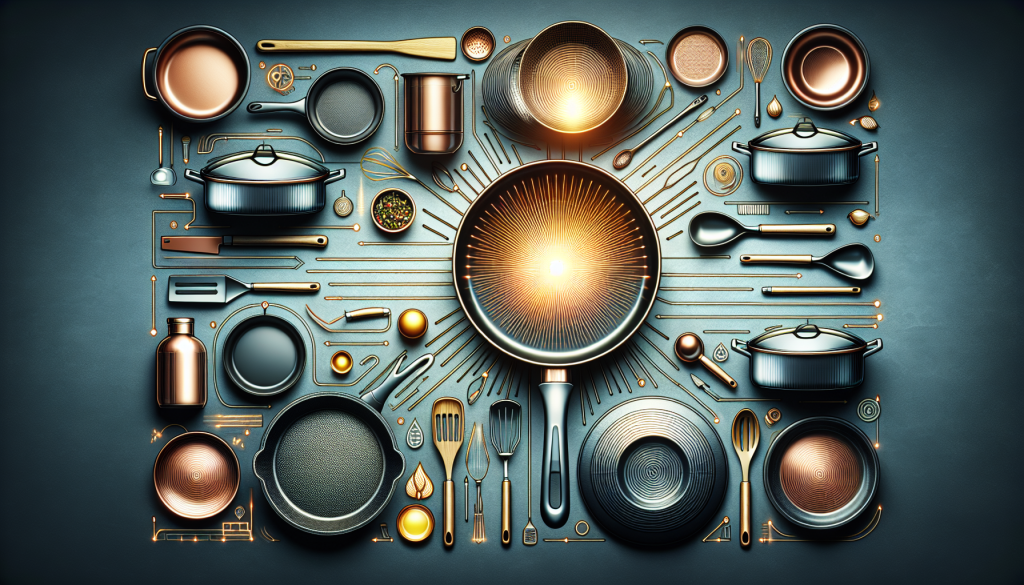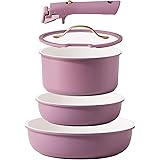When it comes to selecting the perfect cookware for your kitchen, it’s essential to know what key features to look for in high-quality options. From durability to heat distribution, these factors can greatly influence your cooking experience. In this article, we will explore the crucial aspects that define superior cookware and help you make informed choices for a seamless cooking journey. So, buckle up and get ready to discover the must-have qualities that will take your culinary skills to the next level. When it comes to investing in high-quality cookware, there are several key features to consider. From material and construction to heat distribution and non-stick properties, these factors can greatly impact your cooking experience. Additionally, versatility, safety, ease of use, longevity, price, and aesthetics should also be taken into account. Let’s explore each of these aspects in detail.
Some suggestions to consider!
CAROTE 21Pcs Pots and Pans Set, Nonstick Cookware Sets, White Granite Induction Cookware Non Stick Cooking Set w/Frying Pans & Saucepans(PFOS, PFOA Free)
31% Off16PCS Pots and Pans Set Non Stick Cookware Set Nonstick with Cooking Set
$54.98 (as of February 21, 2026 09:30 GMT +00:00 - More infoProduct prices and availability are accurate as of the date/time indicated and are subject to change. Any price and availability information displayed on [relevant Amazon Site(s), as applicable] at the time of purchase will apply to the purchase of this product.)CAROTE 5pcs Pots and Pans Set, Nonstick Cookware Set Detachable Handle,kitchen essentials,RV kitchen pot and pan,Induction Cookware,Oven Safe,PFOA PFOS FREE,Purple
$29.99 (as of February 21, 2026 09:30 GMT +00:00 - More infoProduct prices and availability are accurate as of the date/time indicated and are subject to change. Any price and availability information displayed on [relevant Amazon Site(s), as applicable] at the time of purchase will apply to the purchase of this product.)

Material
The choice of material in cookware greatly affects its performance and durability. Look for materials that are known for their excellent heat conductivity and durability, such as stainless steel, cast iron, or copper. Stainless steel is a popular choice due to its resistance to corrosion and staining, while cast iron offers unparalleled heat retention. Copper is highly regarded for its unmatched heat conductivity, allowing for precise temperature control.
Durability
Durability is a crucial factor when it comes to cookware. Look for cookware that is crafted from materials known for their strength and longevity. Stainless steel and cast iron are both renowned for their durability, while non-stick cookware should have a sturdy construction and high-quality coating to ensure it withstands daily use without scratching or peeling.
Heat Conductivity
Efficient heat conductivity is essential for consistent and even cooking results. Materials like copper and aluminum are excellent conductors of heat, ensuring that your food is cooked evenly from edge to center. Look for cookware with a combination of materials, such as stainless steel with a copper or aluminum core, to ensure excellent heat distribution throughout the cooking process.
Non-reactivity
Choosing cookware that is non-reactive is crucial, as it prevents the leaching of harmful chemicals into your food. Stainless steel and enamel-coated cookware are generally considered safe options, as they do not react with acidic or alkaline foods. Avoid cookware with non-stick coatings that contain harmful chemicals like PFOA or PTFE, as these can be released into the food when heated.
Maintenance
Consider the maintenance requirements of the cookware you are interested in. Some materials, like stainless steel, are relatively low maintenance and can be easily cleaned with soap and water. Non-stick cookware requires more delicate care to preserve the integrity of the coating. Make sure to read and follow the manufacturer’s instructions regarding cleaning and maintenance to ensure the longevity of your cookware.
Construction
The construction of cookware plays a significant role in its performance and durability. Pay attention to the thickness of the cookware, as thicker pans and pots tend to distribute heat more evenly and are less prone to warping. Look for cookware with a sturdy base that sits flat on the stovetop, ensuring even heat distribution. Handles should be securely attached and heat-resistant for safe handling, while lids should fit snugly to trap heat and moisture.
Thickness
Cookware thickness is an important factor to consider, as it directly impacts heat distribution and cooking performance. Thicker cookware tends to distribute heat more evenly, preventing hot spots and ensuring consistent results. Look for cookware with a thick base and walls for optimal heat retention and distribution.
Base
The base of cookware should be flat and even to ensure efficient heat transfer. Induction cooktops require cookware with a magnetic base, while all stovetops benefit from pots and pans with a thick, sturdy base. To check the stability of the base, place the cookware on a flat surface, and ensure that there are no wobbles or bumps.

Handles
Handles are an important aspect of cookware construction, as they determine the ease and safety of handling. Look for handles that are ergonomically designed for a comfortable grip and good balance. Heat-resistant handles are essential to prevent burns, especially when cooking on the stovetop or transferring the cookware from the oven to the stovetop.
Lids
Well-fitted lids are crucial for efficient cooking. A tightly fitting lid helps trap heat and moisture, resulting in flavorful and tender dishes. Look for cookware with lids that sit snugly on the pots or pans, with a heat-resistant handle for easy lifting. Transparent lids are also beneficial, allowing you to monitor the cooking process without lifting the lid and losing valuable heat.
Heat Distribution
Even heat distribution is a key characteristic of high-quality cookware. Poor heat distribution can lead to unevenly cooked food, with some areas burning while others remain undercooked. Look for cookware that is known for its excellent heat conductivity, such as copper or stainless steel with an aluminum or copper core. This ensures that heat is evenly distributed across the bottom and sides of the cookware, allowing for consistent cooking results.
Even Heating
Achieving even heating is crucial for cooking success. Look for cookware that heats evenly, ensuring that all parts of the pan or pot reach the desired temperature simultaneously. This helps prevent hot spots, where certain areas of the cookware are significantly hotter than others. Even heating allows for precise control over cooking temperatures and helps avoid burning or undercooking your dishes.

Hot Spot Prevention
Hot spots can occur in cookware that does not distribute heat evenly. These areas can be significantly hotter than the rest of the cookware and can lead to uneven cooking. Look for cookware with a combination of materials or a multi-ply construction, as this helps prevent hot spots by ensuring that heat is evenly spread across the surface.
Non-Stick Properties
Non-stick cookware has become increasingly popular for its ease of use and cleaning. When considering non-stick properties, it is important to evaluate the quality of the coating and its durability. Look for cookware with a high-quality non-stick coating that is resistant to scratching and peeling. This will ensure that your cookware remains non-stick for an extended period, allowing for effortless release of food and easy cleaning.
Coating Quality
The quality of the non-stick coating is crucial for its longevity and performance. Look for cookware with a reputable non-stick coating, known for its durability and resistance to scratching. Opt for cookware that is PFOA and PTFE-free, as these chemicals can be harmful when released into the air or consumed with food.
Ease of Cleaning
One of the benefits of non-stick cookware is its easy cleaning. Look for cookware that is dishwasher safe or can be easily cleaned with mild soap and water. Non-stick pans or pots should be effortless to clean, with food easily releasing from the surface. Follow the manufacturer’s recommendations for cleaning to ensure the longevity of the non-stick coating.

Versatility
Cookware that is compatible with different types of stovetops and ovens offers increased versatility in your kitchen. Look for cookware that is suitable for all stovetop types, including induction, gas, electric, and ceramic. Additionally, check if the cookware is oven-safe, allowing you to easily transfer dishes from stovetop to oven without needing to switch to a different pan or pot.
Compatibility with Different Types of Stovetops
If you have multiple types of stovetops or plan to upgrade in the future, it is important to consider cookware compatibility. Look for cookware that is labeled as suitable for all stovetop types, including induction. This ensures that your cookware will work seamlessly across different surfaces, providing versatility and eliminating the need for separate cookware for each stovetop.
Oven-Safe Capability
Oven-safe cookware allows you to easily transition from stovetop to oven without the need to transfer food to a different dish. Look for cookware that is oven-safe up to a desired temperature, ensuring that it can withstand the heat of your oven. This capability is particularly useful for recipes that require finishing or baking in the oven, such as casseroles or skillet-baked dishes.
Safety
Safety should be a top priority when selecting cookware for your kitchen. Consider the following safety features when making your decision.

Non-Toxic Materials
Opt for cookware made from non-toxic materials to ensure the safety of your food. Stainless steel, enamel-coated, and cast iron cookware are generally considered safe options. Avoid cookware with non-stick coatings that contain harmful chemicals like PFOA or PTFE, as these can potentially leach into your food when heated.
Handle Insulation
Heat-resistant handles are crucial for safe handling while cooking. Look for cookware with handles made from materials that stay cool to the touch, even when the cookware is hot. This prevents accidental burns when moving or lifting the cookware.
Lid Tightness
Well-fitted lids are not only important for cooking performance but also for safety. A tightly fitting lid prevents hot liquids from splattering and reduces the risk of burns. Look for cookware with lids that fit snugly to ensure a secure seal, minimizing the chance of accidents while cooking.
Ease of Use
The ease of use of cookware greatly impacts your cooking experience. Consider the following factors when evaluating the usability of cookware.
Weight
The weight of your cookware can greatly affect its maneuverability and ease of use. Cookware that is too heavy may be difficult to handle, especially when filled with food. Look for cookware that strikes a balance between weight and sturdiness, allowing for easy lifting and control.
Balanced Handles
Ergonomically designed handles that are well-balanced help ensure a comfortable grip and ease of maneuverability. Handles that are too long or too short may cause discomfort or lack leverage when handling larger cookware. Look for handles that feel comfortable in your hand and provide good control.
Pouring Spouts
Cookware with pouring spouts makes draining and serving liquids much easier. These spouts allow for precise pouring without any spills or drips. Look for cookware with well-designed pouring spouts that are strategically placed to allow for controlled pouring without the need for additional utensils.
Longevity
Investing in high-quality cookware means looking for options that can last for years to come. Consider the following factors when evaluating the longevity of cookware.
Warranty
A warranty is a valuable indicator of a manufacturer’s confidence in their product’s quality and durability. Look for cookware that comes with a generous warranty, covering any defects or issues that may arise. A longer warranty period often indicates that the manufacturer stands behind the quality of their cookware.
Brand Reputation
Research the reputation of the brand before making your purchase. Brands with a long-standing history and positive reviews are more likely to produce high-quality cookware. Look for brands that are known for their attention to detail, craftsmanship, and commitment to producing durable and reliable cookware.
Price
While price is an important consideration, it should not be the sole determining factor in choosing high-quality cookware. Consider the overall value for money rather than simply focusing on the initial price tag.
Value for Money
Consider the overall value for the price when selecting cookware. Look for cookware that offers a combination of all the desired features within your budget. While it may be tempting to opt for lower-priced cookware, investing in high-quality options will ensure long-term satisfaction and performance.
Budget Considerations
Set a budget that aligns with your needs and preferences. This will help narrow down your options and prevent overspending. Assess the features that are most important to you and allocate your budget accordingly. It’s better to invest in a few high-quality pieces that meet your requirements rather than purchasing a large quantity of lower-quality cookware.
Aesthetics
While aesthetics may not directly impact the performance or functionality of cookware, it can enhance your overall cooking experience. Consider the following aesthetic factors when selecting cookware.
Design
The design of your cookware contributes to its visual appeal and can complement your kitchen decor. Look for cookware with a timeless and versatile design that will stand the test of time. Sleek and minimalist designs are often favored, as they fit well in a variety of kitchen styles.
Color Options
Some cookware brands offer a range of color options, allowing you to add a pop of personality to your kitchen. Consider whether you prefer classic stainless steel finishes or if you are interested in cookware that comes in vibrant or unique colors. Remember that color options may vary depending on the brand and collection.
In closing, when seeking high-quality cookware, it is essential to consider a range of features. Material, construction, heat distribution, non-stick properties, versatility, safety, ease of use, longevity, price, and aesthetics all play a crucial role in selecting the perfect cookware for your needs. By carefully evaluating each of these factors, you can make an informed decision and invest in cookware that will elevate your cooking experience for years to come.
Other Questions People Ask
How do the properties of different materials impact their durability?
The durability of a material is influenced by its inherent properties like strength, resistance to moisture, and flexibility. For example, steel is highly durable and resistant to pests, while wood may require treatment to prevent rot. Selecting materials with suitable durability ensures the longevity of your project.
What factors should I consider when selecting a material for outdoor use?
When choosing materials for outdoor applications, consider weather resistance, UV stability, and maintenance needs. Materials like treated wood, concrete, or certain metals are better suited for outdoor environments. Proper selection helps prevent deterioration and extends the lifespan of outdoor structures.
What is Material and why is it important?
Understanding what Material entails provides a solid foundation for further learning. It encompasses both the key concepts and the role it plays in its broader context. Knowing why it matters helps you prioritize it appropriately and recognize the benefits it can offer. This perspective also guides your decisions about when and how to apply Material.








